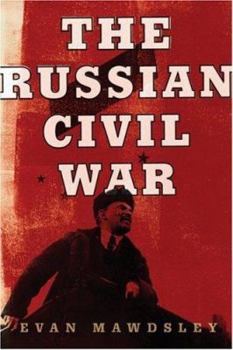The Russian Civil War
Select Format
Select Condition 
Book Overview
"The best book ever written on the Russian civil war. A first-rate work of scholarly synthesis." Robert McNeal This description may be from another edition of this product.
Format:Hardcover
Language:English
ISBN:1933648155
ISBN13:9781933648156
Release Date:March 2007
Publisher:Pegasus Books
Length:362 Pages
Weight:1.51 lbs.
Dimensions:1.2" x 6.4" x 9.0"
Customer Reviews
4 ratings
This book book has weak maps and forgets facts
Published by Thriftbooks.com User , 15 years ago
I read this good book, here in Brazil. This book book is really a good choice to learn, about the Russian Civil War. One thing became clear when, you read this book: The Reds never were even near to lost this civil war. The were far stronger, united and had the monopoly in weapons and ammuntion production. The Reds' control of the far majority of Russian population, since the begining, also gave to the Reds far more troops than to the Whites. The author also recognizes, on page 3 and 4, the fact that Russian Revolution was the start of Russian Civil war. Defects of this book: 1-The maps are are few, too general, weak and do not aid the reader's comprehension. I was many times searching the maps in vain to locate a city or town the author was referencing in the text. 2-The author becames lost, when he talks about freemasons, jews and eugenists. About the syphillitic Lenin, this book is weak. On page 79, the author talks something about jews and communism, but he is very weak there. Again on page 130, the author writes:"Has anyone reckoned up," asked Lloyd George, "what an Army of Occupation would cost in Russia?". What thing made David Lloyd George so dumb? Because he was an eugenist? Because he was a freemason or just because he was a dumb? 3-About the external politics of Soviet Union, this book is weak. What thing made all great powers of that times - USA, England, France, Germany, Japan, etc. to let to the Reds the right to control of 16% of world's lands and let all of them into terrible wars in decades later?
Excellent
Published by Thriftbooks.com User , 16 years ago
Excellent coverage of a little covered topic. Very good military and political analysis, particularly on the strategic level. Illustrates the sheer chaos that was the Russian Civil War, with its many factions, twists, and turns. To the best I could tell also relatively fair to all of the participants, the author's conclusions made sense and matched my own understanding and background. Potential readers should note, however, that it is clearly written for someone who wants to understand why Bolsheviks won and how they did it, and not a simple human interest story. For someone simply wanting an interesting read it would be dry. If you need to know about the Russian Civil War, however, this is your book.
Reds v. Whites
Published by Thriftbooks.com User , 16 years ago
The Russian Civil War of 1917-1920 was a very complicated affair, covering vast stretches of Russian territory, and numerous armies, armored trains (as in"Doctor Zhivago"), and almost untold numbers of names of people involved. This book is fairly well written, but it does get plodding on more than one occasion, which isn't surprising, given what I've mentioned above. My chief fault with this book is that it tends to assume that the reader has quite a bit of familiarity with the era, the people involved and certain instances(such as the "Ice March"). If you're simply a general reader seeking to find out what happened, you're going to get more than a bit confused. The author tries to cram too much detail into too little space, and that hurts the book overall. For a more reader friendly work on the same topic, read the book by W. Bruce Lincoln, "Red Victory".
Best short history of Russian Civil War
Published by Thriftbooks.com User , 24 years ago
Among the innumerable books and essays on the Russian Civil War, this is by far the best book to start with. It's reasonably short, very readable, has helpful maps, and an excellent bibliography. It's one of the few books to present a coherent, unified account of an extremely complex and messy historical episode. Best of all, Mawdsley, who is (or at least was until recently) a professional historian at the University of Glasgow, writes his book without basing it on any particular political viewpoint, whereas the great majority of books on the Russian Civil War have an axe to grind. In order to keep the book readable and reasonably short, Mawdsley omits a great deal of important information; for the reader who wants to delve further, Volume Two of William Henry Chamberlin's `The Russian Revolution, 1917 - 1921' originally published in 1934, is still the book to read next after Mawdsley.Unfortunately, Mawdsley's book is out of print and seems to be hard to come by. However, a determined book search can locate a copy, or of course your local library can get a copy on interlibrary loan. I wish it was back in print.






